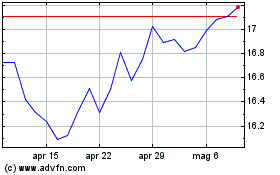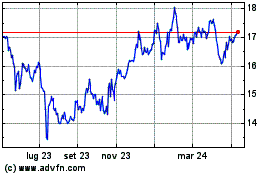By Drew FitzGerald and Brent Kendall
An unusual merger trial starting Monday could have long-lasting
effects on the consumer wireless market and beyond by potentially
upending the federal government's dominant role in deciding whether
corporate rivals can join forces.
T-Mobile US Inc. and Sprint Corp., the country's third- and
fourth-largest carriers by cellphone subscribers, are defending
their $26 billion plan to merge into a nationwide heavyweight
rivaling Verizon Communications Inc. and AT&T Inc. The would-be
merger partners must defeat a coalition of 13 states and the
District of Columbia, all led by Democratic attorneys general, who
are suing to block the deal.
The lawsuit has flipped the script for corporate merger reviews
by standing in conflict with the views of the federal government.
Federal antitrust and telecom officials, appointed by President
Trump, approved the deal earlier this year, believing they
addressed the merger's shortcomings through concessions they
required from T-Mobile and Sprint.
Legal experts say it is unprecedented for the states to reject
such a settlement and sue to block a merger of this size and
national scope without the support or involvement of federal
authorities.
A victory for the carriers, which say the merger will allow them
to offer better services, could arm other companies with new
arguments for the benefits of consolidation. But a win for the
coalition could give states newfound power in antitrust enforcement
when they are also investigating U.S. tech giants.
If the states prevail, "companies will have to take them more
seriously, " said New York University law professor Harry First.
"They'll have to have really serious discussions with states like
California and New York."
"If we have another four years of the Trump administration, we
may see more of this," Mr. First said. The Justice Department
declined to comment.
Both sides will deliver opening arguments Monday before Judge
Victor Marrero in federal court in New York. The bench trial is
expected to last about three weeks with testimony from a colorful
cast of executives, including longtime T-Mobile boss John Legere,
Sprint Chairman Marcelo Claure and Dish Network Corp. Chairman
Charlie Ergen. T-Mobile in November said Mr. Legere will step down
as CEO next year, part of a long-planned transition that will hand
the top job to operating chief Mike Sievert.
Lawyers for the states and companies agreed last week to scrap a
potential last-minute meeting to discuss an out-of-court
settlement, an acknowledgment that past negotiations haven't borne
fruit, according to court filings. The two sides could still reach
a deal during the trial.
T-Mobile and Sprint announced their plan to join forces in April
2018. T-Mobile is controlled by Deutsche Telekom AG, and Sprint is
controlled by Japan's SoftBank Group Corp. Sprint abandoned an
earlier effort to combine in 2014 amid opposition from antitrust
officials in the Obama administration.
Federal Communications Commission Chairman Ajit Pai threw his
support behind the deal in May, backing the companies' argument
that their combined resources would fuel faster investment in
fifth-generation, or 5G, cellular service. The FCC declined to
comment.
But the Justice Department, which by law is tasked with
reviewing a merger's competitive effects, wasn't immediately
convinced, and pushed T-Mobile and Sprint to do more to address
consolidation that would remove another national wireless carrier
from the market.
A group of state antitrust enforcers led by New York and
California took advantage of the lag to sue the companies in
federal court. Their case makes a simple assertion: Putting
together two wireless companies with a record of aggressive
discounts would make cellphone plans more expensive than they would
be if the two rivals were kept apart.
The Justice Department reached a settlement with the companies
in July. The department's antitrust division said it would approve
the merger subject to commitments from the companies. They included
arming satellite-TV provider Dish with the building blocks for a
built-from-scratch cellphone network, which would preserve the
market's four-player structure.
Many state officials weren't satisfied, arguing in a pretrial
brief that the deal would create "a more staid market with prices
higher than they would otherwise be -- billions of dollars higher
in the aggregate -- and less innovation."
The companies argued their complementary assets, including
valuable radio spectrum licenses, would serve customers more
efficiently. "Without the merger, Sprint and T-Mobile will continue
to face competitive challenges and escalating costs," the companies
wrote, which would allow AT&T and Verizon to maintain their
dominant positions.
AT&T and Verizon serve about 100 million domestic customers
apiece. T-Mobile and Sprint would approach roughly the same number
by combining.
T-Mobile's shares have continued to climb as the company wins
more customers. Sprint's stock has slumped as subscribers depart
and the deal's outcome remains unresolved. Sprint traded at a
roughly 30% discount to the value of the all-stock deal Friday.
"There's definitely been investor fatigue with this one," said
Jennifer Fritzsche, a Wells Fargo Co. telecom analyst. "It's gone
on almost two years now."
Adding to the drama, the tally of states on either side of the
case has seesawed, amid growing tensions between the plaintiffs and
the Justice Department. California and New York recruited allies
from other states, only to see some defect.
Illinois, Oregon and Pennsylvania joined the states' lawsuit.
Colorado, Mississippi and Nevada switched sides after the companies
offered them commitments to improve coverage and protect rates.
Texas Attorney General Ken Paxton, a Republican, added political
gravity to the mostly Democratic state coalition by joining its
lawsuit in August, only to switch sides by settling with the
companies in November.
Write to Drew FitzGerald at andrew.fitzgerald@wsj.com and Brent
Kendall at brent.kendall@wsj.com
(END) Dow Jones Newswires
December 08, 2019 11:15 ET (16:15 GMT)
Copyright (c) 2019 Dow Jones & Company, Inc.
Grafico Azioni AT&T (NYSE:T)
Storico
Da Mar 2024 a Apr 2024

Grafico Azioni AT&T (NYSE:T)
Storico
Da Apr 2023 a Apr 2024
